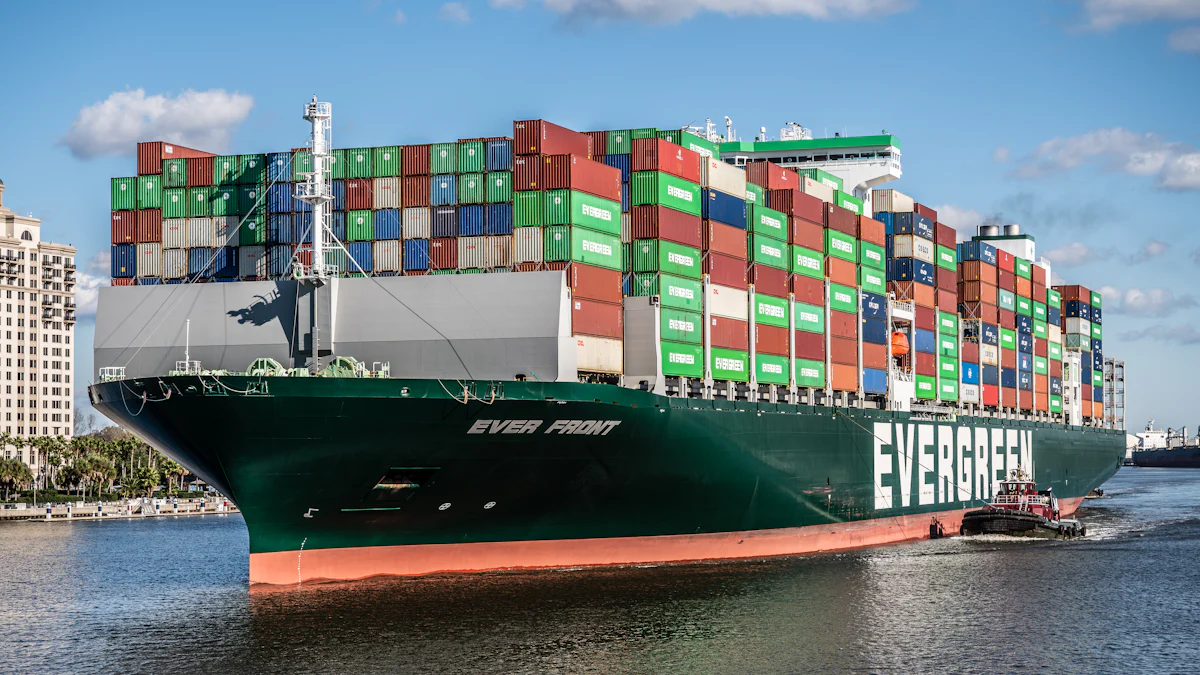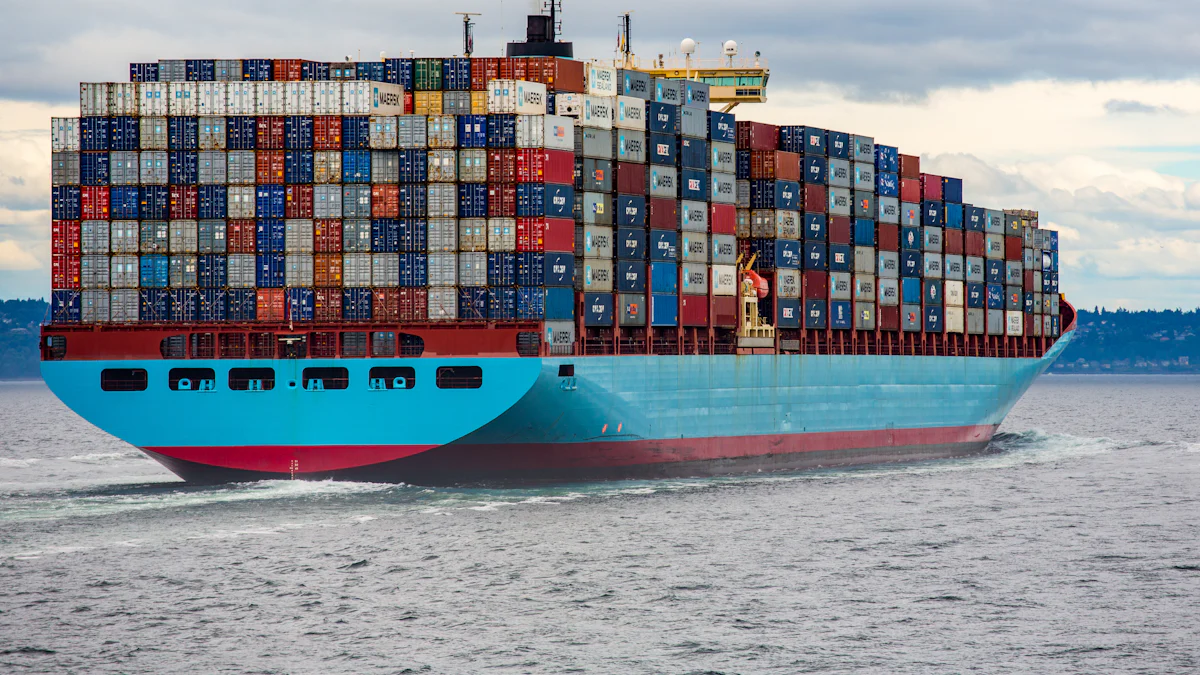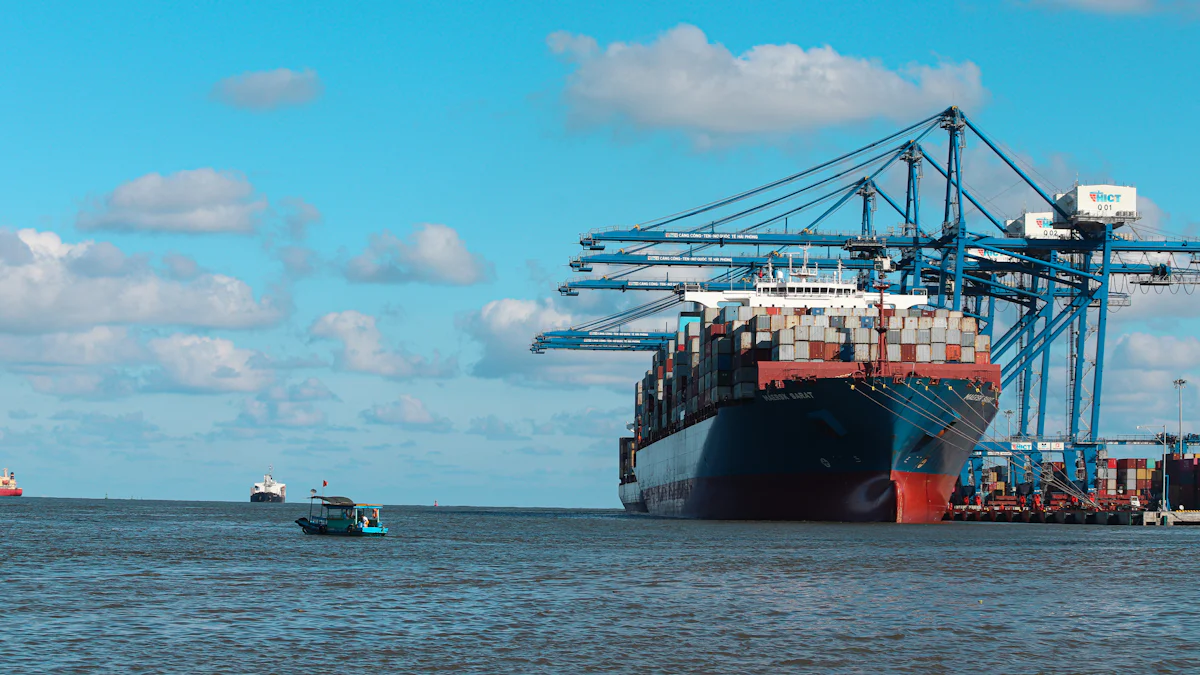Market Dynamics of Ocean Freight: What the Future Holds

Ocean freight plays a crucial role in global trade. The industry has seen immense growth, with world trade volume expanding 45 times since the early days of the GATT. Understanding market dynamics is essential for navigating this complex landscape. This blog aims to explore the current trends and future predictions in ocean freight.
Current State of the Ocean Freight Market

Economic Factors
Impact of Global Economy on Ocean Freight
The global economy significantly influences ocean freight. Economic growth drives demand for goods, leading to increased shipping volumes. Conversely, economic downturns reduce trade activity, causing a drop in freight rates. For example, the COVID-19 pandemic disrupted global supply chains, resulting in fluctuating demand and volatile freight rates. Economic policies, such as tariffs and trade agreements, also impact shipping volumes and routes.
Currency Fluctuations and Freight Rates
Currency fluctuations affect freight rates. When a currency depreciates, import costs rise, reducing demand for imported goods. This decrease in demand can lead to lower freight rates. Conversely, a strong currency makes imports cheaper, increasing demand and potentially raising freight rates. For instance, the U.S. dollar's strength or weakness against other currencies can influence shipping costs for American importers and exporters.
Technological Advancements
Automation and Digitalization
Automation and digitalization revolutionize ocean freight. Automated ports and terminals improve efficiency by reducing loading and unloading times. Digital platforms streamline booking processes, making it easier for shippers to manage shipments. These advancements reduce operational costs and enhance service reliability. For example, automated cranes and vehicles at ports speed up cargo handling, leading to faster turnaround times.
Innovations in Shipping Technology
Innovations in shipping technology drive the industry forward. Advanced ship designs improve fuel efficiency, reducing environmental impact. Smart containers equipped with sensors provide real-time tracking and monitoring, enhancing cargo security. Blockchain technology ensures transparency and traceability in supply chains. These innovations increase operational efficiency and reliability. For instance, the use of liquefied natural gas (LNG) as a cleaner fuel alternative reduces greenhouse gas emissions from ships.
Understanding these economic factors and technological advancements helps stakeholders navigate the complex ocean freight market. Embracing these changes can lead to more efficient and sustainable shipping practices.
Key Factors Influencing Market Dynamics
Supply Chain Disruptions
Causes of Disruptions
Supply chain disruptions occur due to various reasons. Natural disasters such as hurricanes and earthquakes can halt operations at ports. Labor strikes also cause significant delays in shipping schedules. Political instability in key regions affects the smooth flow of goods. For example, geopolitical tensions can lead to the closure of important shipping routes. Additionally, pandemics like COVID-19 disrupt global supply chains by causing sudden shifts in demand and supply.
Mitigation Strategies
Companies must adopt effective strategies to mitigate supply chain disruptions. Diversifying suppliers helps reduce dependency on a single source. Implementing a lean inventory system can lower costs and improve efficiency. Enhanced collaboration between suppliers leads to better product quality. Real-time tracking and monitoring of shipments provide greater visibility. Companies that recover faster from disruptions gain a competitive edge. Streamlining the supply chain process also improves overall efficiency.
Environmental Regulations
IMO 2020 and Its Impact
The International Maritime Organization (IMO) introduced new regulations in 2020. These regulations aim to reduce sulfur emissions from ships. Compliance with IMO 2020 requires ships to use low-sulfur fuel or install scrubbers. This shift increases operational costs for shipping companies. However, it also reduces the environmental impact of ocean freight. Cleaner fuel alternatives like liquefied natural gas (LNG) help achieve these goals. The industry must adapt to these changes to meet environmental standards.
Future Environmental Policies
Future environmental policies will likely focus on further reducing emissions. Governments may introduce stricter regulations to combat climate change. Investment in renewable energy sources will become crucial. Green shipping practices will gain more importance. Companies must innovate to stay compliant with evolving policies. Sustainable shipping solutions will drive the future of ocean freight. Embracing these changes will ensure long-term success in the industry.
Geopolitical Factors
Trade Wars and Tariffs
Trade wars and tariffs significantly impact ocean freight. Increased tariffs raise the cost of imported goods. This leads to reduced demand for international shipping. Trade wars create uncertainty in the market. Companies must navigate these challenges to maintain profitability. Political decisions influence trade agreements and shipping routes. Adapting to these changes is essential for staying competitive.
Political Stability and Shipping Routes
Political stability plays a crucial role in determining shipping routes. Stable regions offer reliable and secure shipping lanes. Political unrest can lead to the closure of key routes. Companies must monitor geopolitical developments closely. Strategic planning helps mitigate risks associated with political instability. Reliable shipping routes ensure timely delivery of goods. Maintaining flexibility in routing decisions enhances operational efficiency.
Future Trends and Predictions

Growth of E-commerce
Impact on Shipping Volumes
E-commerce growth has transformed the shipping industry. Online shopping has surged, leading to a significant increase in shipping volumes. Companies must adapt to handle higher demand efficiently. Enhanced logistics and advanced technologies play a crucial role. Shipping companies now prioritize speed and reliability to meet consumer expectations. The rise of e-commerce has reshaped operations across the industry.
Changes in Consumer Behavior
Consumer behavior has evolved with the growth of e-commerce. Shoppers now expect fast and reliable delivery services. Convenience and speed have become top priorities for consumers. Shipping companies must innovate to meet these demands. Real-time tracking and flexible delivery options enhance customer satisfaction. The shift in consumer behavior drives continuous improvement in shipping practices.
Sustainability Initiatives
Green Shipping Practices
Sustainability initiatives are gaining momentum in ocean freight. Green shipping practices aim to reduce environmental impact. Companies invest in cleaner fuel alternatives like liquefied natural gas (LNG). Energy-efficient ship designs also contribute to sustainability goals. Shipping companies adopt eco-friendly technologies to minimize emissions. These efforts align with global environmental standards and regulations.
Investment in Renewable Energy
Investment in renewable energy is crucial for the future of ocean freight. Solar and wind energy offer sustainable power sources for ships. Companies explore innovative solutions to reduce reliance on fossil fuels. Renewable energy investments support long-term environmental goals. Sustainable practices ensure compliance with evolving regulations. The industry moves towards a greener and more sustainable future.
Technological Innovations
Blockchain in Shipping
Blockchain technology revolutionizes the shipping industry. It ensures transparency and traceability in supply chains. Blockchain enhances security by preventing data tampering. Shipping companies use blockchain to streamline documentation processes. This technology improves efficiency and reduces administrative costs. Blockchain adoption drives innovation and reliability in ocean freight.
Autonomous Ships
Autonomous ships represent the future of ocean freight. These vessels operate without human intervention, using advanced navigation systems. Autonomous ships enhance safety and efficiency in maritime operations. Reduced labor costs and increased operational efficiency are key benefits. The industry invests in research and development to advance autonomous shipping technology. Autonomous ships will play a pivotal role in the future of ocean freight.
JUSDA's Role in Shaping the Future of Ocean Freight
Comprehensive Ocean Freight Network
Global Reach and Service Points
JUSDA has established a robust global network. This network includes cross-border transfer centers and international logistic partnerships. These partnerships span North America, Europe, Japan, Vietnam, India, and Southeast Asia. The extensive location networks worldwide enhance business efficiency. JUSDA operates 155 service locations globally. The company also manages over 2.5 million square meters of warehousing space. This global reach ensures seamless operations for enterprises worldwide.
Change your shipping service experience
Get a High-Converting Landing Page in Just One Minute
Full Container Load (FCL) and Less than Container Load (LCL) Options
JUSDA offers flexible shipping options to meet diverse needs. Full Container Load (FCL) and Less than Container Load (LCL) options provide cost-effective solutions. FCL is ideal for large shipments requiring dedicated containers. LCL allows businesses to share container space, reducing costs for smaller shipments. These options enable companies to choose the most efficient shipping method based on their specific requirements.
Value-Added Services
Temperature-Controlled and Special Container Transportation
JUSDA provides specialized transportation services. Temperature-controlled containers ensure the safe transport of sensitive goods. Industries such as pharmaceuticals, food, and high-tech electronics benefit from these services. Special container transportation caters to unique shipping needs. These value-added services expand JUSDA's market reach and customer base.
Dedicated Warehouse Operations
JUSDA excels in dedicated warehouse operations. The company manages over 45 logistics and service centers. These centers ensure efficient storage and distribution of goods. Advanced technologies optimize warehouse operations. Real-time tracking enhances visibility and control over inventory. Dedicated warehouse operations improve overall supply chain efficiency.
Commitment to Innovation
Product Development and Cost Optimization
JUSDA remains committed to product innovation. The company continuously develops diversified products. This approach meets evolving customer needs and regulatory requirements. Cost optimization strategies reduce operational expenses. JUSDA leverages advanced technologies to enhance efficiency. This commitment to innovation drives operational excellence.
Leveraging Advanced Technologies
JUSDA integrates advanced technologies into its operations. The company utilizes big data, IoT, and cloud platforms. These technologies enable real-time tracking and monitoring. JUSDA's JusLink platform exemplifies this approach. JusLink integrates suppliers, manufacturers, service providers, and customers. This integration facilitates efficient resource utilization and precise decision-making. Advanced technologies set new benchmarks for industry practices.
Technological Integration
Real-Time Tracking and Monitoring
JUSDA excels in integrating advanced technologies into supply chain operations. The company utilizes big data, IoT, and cloud platforms to enable real-time tracking and monitoring of shipments. These technologies provide customers with greater visibility and control over their supply chains. Real-time tracking enhances efficiency by allowing businesses to monitor the status of their goods at every stage of the journey. This capability reduces delays and ensures timely deliveries, which is crucial for maintaining customer satisfaction.
JusLink Platform and Intelligent Supply Chain Systems
The JusLink platform exemplifies JUSDA's commitment to innovation. This intelligent supply chain system integrates suppliers, manufacturers, service providers, and customers. JusLink facilitates efficient resource utilization and precise decision-making. By leveraging AI and digital trends, JusLink ensures seamless coordination from component sourcing to end-customer delivery. This vertical integration strategy enhances transparency and sets new standards for industry practices. Businesses using JusLink can optimize transportation routes and improve production scheduling, leading to increased operational efficiency.
Recognitions and Certifications
Awards and Industry Recognitions
JUSDA's excellence in supply chain management has earned numerous awards and recognitions. The company has been consecutively listed on the Chinese logistics service industry unicorn enterprise list and the Hurun Global Unicorn List from 2019 to 2024. In 2023, JUSDA received the "Dingge Award Annual Industrial Platform Enterprise" from the Harvard Business Review (Chinese version). These accolades underscore JUSDA's commitment to quality and innovation in the logistics sector.
Certifications and Memberships
JUSDA holds several prestigious certifications that highlight its dedication to excellence. The company has received national AAAAA comprehensive logistics enterprise certification and AEO enterprise senior certification. JUSDA also maintains ISO9001 certification, ensuring adherence to international quality management standards. As a member of the World Freight Alliance, JUSDA aligns with global best practices in logistics. These certifications and memberships validate JUSDA's position as a trusted leader in supply chain management.
The current state of ocean freight reveals a complex landscape influenced by economic factors, technological advancements, supply chain disruptions, environmental regulations, and geopolitical factors. Future trends point towards the growth of e-commerce, sustainability initiatives, and technological innovations like blockchain and autonomous ships.
JUSDA plays a pivotal role in shaping the future of ocean freight. The company's comprehensive network, value-added services, and commitment to innovation drive efficiency and reliability. Staying informed about market dynamics is crucial for navigating this evolving industry.
Stay updated with industry news and trends to remain competitive and informed.
See Also
Revealing the Latest in Sea Freight Logistics for 2024
Analyzing the Complete Future of Less Than Truckload Freight
Understanding the Effects: Trends in Risky Logistics
Paving the Way: Tomorrow's Logistics Through Digital Tech
Revolutionizing Logistics of the Future with AI in Supply Chain
